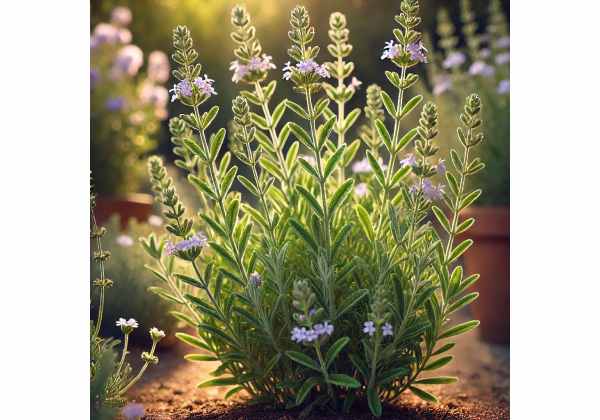
Lemon Verbena is a fragrant herb celebrated for its exquisite lemon-citrus aroma and a wealth of health-promoting properties. Renowned for its potent essential oils, rich in citral, geranial, and other bioactive compounds, this herb has long been used in traditional medicine, culinary arts, and aromatherapy. Its natural benefits include antioxidant, anti-inflammatory, and digestive support, making it a versatile remedy for enhancing overall wellness. Additionally, Lemon Verbena is prized for its calming effects on the mind and body, contributing to stress relief and improved mood. Its diverse applications continue to inspire both modern research and age-old herbal practices.
Table of Contents
- Botanical Overview and Identification
- Phytochemical Profile and Key Compounds
- Health Benefits and Core Qualities
- Practical Applications and Usage Guidelines
- Scientific Research and Study Insights
- Frequently Asked Questions
Botanical Overview and Identification
Lemon Verbena (Aloysia citrodora) is a perennial shrub belonging to the Verbenaceae family, native to South America but now widely cultivated in warm regions around the globe. This herb is easily recognized by its narrow, lance-shaped leaves, which are a vibrant green with a slight silvery hue on the underside. The leaves release a potent lemon fragrance when touched or bruised—a quality that distinguishes Lemon Verbena from other aromatic herbs. In the late spring and early summer, it produces clusters of small, delicate white or pale lavender flowers that attract bees and butterflies, further adding to its ornamental value.
Taxonomy and Morphology
Taxonomically, Lemon Verbena is classified as Aloysia citrodora. Historically, it was used by indigenous communities in its native range for its medicinal properties, long before it gained popularity in European herbal medicine. The plant’s structure is characterized by an erect, bushy growth habit with multiple stems and a sprawling canopy that can reach heights of 4 to 6 feet under optimal conditions. The leaves are arranged oppositely along the stems and are covered with fine hairs that contribute to the release of volatile oils. This hairiness not only enhances the aromatic profile but also provides a natural protective barrier against pests and excessive water loss.
Growth Conditions and Natural Habitat
Lemon Verbena thrives in full sun and well-drained soils, making it an excellent candidate for xeriscaping in arid climates. Originally adapted to the warm, subtropical climates of South America, it has proven remarkably resilient in various temperate regions, provided it is protected from frost. The plant prefers slightly acidic to neutral soil conditions and benefits from organic matter enrichment, which promotes vigorous growth and abundant essential oil production. In its natural habitat, Lemon Verbena often grows in open fields and along riverbanks, where the interplay of sunlight and moisture creates ideal conditions for its development.
Cultivation and Ecological Importance
Cultivators value Lemon Verbena not only for its culinary and medicinal uses but also for its aesthetic appeal. Gardeners often incorporate this herb into herb gardens, borders, and container plantings due to its compact growth habit and striking, aromatic foliage. Propagation is straightforward via stem cuttings or division, ensuring that the distinctive lemon fragrance is faithfully reproduced in subsequent generations. Beyond its ornamental qualities, Lemon Verbena plays a role in ecological gardening by attracting pollinators such as bees and butterflies, which are essential for the health of local ecosystems. Its ability to thrive in low-water conditions also makes it an environmentally sustainable choice in regions facing water scarcity.
Historical and Cultural Significance
Throughout history, Lemon Verbena has been esteemed in traditional medicine for its digestive, anti-inflammatory, and sedative properties. Ancient civilizations used infusions of its leaves to treat gastrointestinal ailments and to alleviate stress. Over time, its use spread to Europe, where it became a staple in herbal medicine and culinary practice. Today, its historical legacy continues as modern research validates many of its traditional uses, confirming its status as a cherished herb in both natural and integrative health practices.
In summary, the botanical profile of Lemon Verbena reveals a plant that is as visually appealing as it is functionally versatile. Its unique morphology, resilient growth characteristics, and rich cultural history underscore its importance in both the natural world and human society. Whether cultivated for its therapeutic properties or enjoyed as a fragrant garden ornamental, Lemon Verbena remains a symbol of nature’s bounty and a testament to the enduring benefits of herbal medicine.
Phytochemical Profile and Key Compounds
The therapeutic and aromatic qualities of Lemon Verbena stem from its rich and diverse phytochemical composition. Extensive research has revealed that its essential oil is a complex mixture of volatile compounds, which work synergistically to deliver a range of health benefits. In this section, we explore the major bioactive constituents that define Lemon Verbena’s unique properties.
- Citral (Geranial and Neral)
Citral is the primary compound responsible for the herb’s characteristic lemon scent. It exists as a mixture of two isomers: geranial and neral. Citral is renowned for its potent antioxidant and anti-inflammatory properties, which contribute to cellular protection and overall health. Research has shown that citral can inhibit the proliferation of certain cancer cells and may play a role in the prevention of chronic diseases. - Limonene
Limonene, another significant monoterpene, imparts a fresh, citrusy note to Lemon Verbena’s aroma. This compound is highly regarded for its antioxidant capabilities, helping to neutralize free radicals and reduce oxidative stress. Additionally, limonene exhibits antimicrobial properties that enhance the herb’s ability to fight infections and support the immune system. - Geraniol
Geraniol contributes a sweet, floral nuance to the overall fragrance of Lemon Verbena. This compound is also an effective antioxidant and has been shown to possess antimicrobial and anti-inflammatory properties. Geraniol is frequently used in cosmetic formulations due to its skin-conditioning effects and its ability to promote a youthful appearance. - Linalool
Linalool is a naturally occurring terpene alcohol that enhances the herb’s aromatic profile with its subtle, floral-citrus scent. Its calming properties have been well documented in aromatherapy, where it is used to alleviate stress and anxiety. In addition to its sedative effects, linalool also contributes to the antimicrobial defense system of Lemon Verbena. - Eugenol
Although present in smaller quantities, eugenol is an important phenolic compound found in Lemon Verbena. Known for its analgesic and antiseptic properties, eugenol adds to the herb’s overall ability to alleviate pain and prevent infections. Its presence further enriches the complex flavor and aroma profile of the plant. - Flavonoids and Phenolic Acids
A broad spectrum of flavonoids and phenolic acids are present in Lemon Verbena, contributing significantly to its antioxidant capacity. These compounds work synergistically to scavenge free radicals, protect against cellular damage, and modulate inflammatory responses. They are also credited with supporting cardiovascular health and improving overall immune function. - Essential Oil Synergy
The combined effects of these compounds create a powerful synergy that enhances the overall bioactivity of Lemon Verbena’s essential oil. This complex interplay not only defines the herb’s unique sensory characteristics but also amplifies its therapeutic effects, making it a versatile agent in natural medicine and aromatherapy.
The diverse phytochemical profile of Lemon Verbena is a testament to nature’s complexity and the intricate ways in which plant compounds interact to promote health. Ongoing studies continue to explore these interactions, offering new insights into the potential applications of this herb in both preventive and therapeutic healthcare. The dynamic blend of citral, limonene, geraniol, linalool, eugenol, and a host of flavonoids underscores the herb’s status as a potent natural remedy with far-reaching benefits.
Health Benefits and Core Qualities
Lemon Verbena is revered not only for its delightful aroma but also for its comprehensive range of health benefits. The herb’s active compounds work together to support various aspects of physical and mental well-being. In this section, we delve into the key health benefits and core qualities that make Lemon Verbena a valuable addition to any natural wellness regimen.
Antioxidant and Anti-inflammatory Support
- Oxidative Stress Reduction:
The rich antioxidant content in Lemon Verbena, particularly from citral, limonene, and various flavonoids, helps neutralize free radicals that cause cellular damage. This protection against oxidative stress is essential for preventing premature aging and reducing the risk of chronic diseases such as cardiovascular conditions and certain cancers. - Inflammation Modulation:
Chronic inflammation is a root cause of many health issues, including arthritis and metabolic disorders. The anti-inflammatory properties of Lemon Verbena, bolstered by compounds like linalool and eugenol, help reduce inflammatory markers in the body. This makes it effective in alleviating pain and discomfort associated with inflammatory conditions.
Digestive and Metabolic Benefits
- Digestive Aid:
Lemon Verbena has been traditionally used to soothe the digestive tract. Its mild carminative properties help reduce bloating, ease indigestion, and promote smoother digestion. Drinking a warm infusion of Lemon Verbena after meals can stimulate digestion and provide a gentle, natural remedy for gastrointestinal discomfort. - Metabolic Support:
The herb may also play a role in supporting metabolic health. By aiding digestion and reducing inflammation, Lemon Verbena helps maintain a balanced metabolism, which is essential for managing weight and preventing metabolic syndrome.
Respiratory and Immune System Enhancement
- Respiratory Relief:
The expectorant and decongestant properties of Lemon Verbena’s essential oil, especially due to compounds like linalool and citral, help clear nasal passages and ease breathing. This makes it beneficial for individuals suffering from colds, sinusitis, or seasonal allergies. Inhalation of its vapor can provide a natural remedy for respiratory congestion. - Immune Boosting:
Regular consumption of Lemon Verbena can support the immune system. Its antimicrobial and antioxidant properties help strengthen the body’s defenses against infections, making it a valuable herb during flu season and periods of high stress.
Cognitive and Emotional Well-Being
- Mental Clarity and Focus:
The refreshing aroma of Lemon Verbena is known to stimulate the mind and enhance cognitive function. By promoting increased blood flow to the brain, it helps improve concentration, memory, and overall mental clarity. This effect makes it a popular choice for those looking to boost productivity and alleviate mental fatigue. - Stress and Anxiety Relief:
The soothing, lemony fragrance of the herb has a calming effect on the nervous system. Aromatherapy using Lemon Verbena essential oil can reduce cortisol levels, lower stress, and promote a sense of relaxation. This contributes to improved emotional balance and overall mental well-being.
Skin and Cardiovascular Health
- Skin Rejuvenation:
Topically, Lemon Verbena is highly valued in skincare formulations. Its antioxidant and anti-inflammatory properties help reduce signs of aging, soothe irritated skin, and promote a youthful complexion. It is commonly used in creams and serums aimed at reducing fine lines and improving skin elasticity. - Cardiovascular Support:
By reducing oxidative stress and inflammation, Lemon Verbena contributes to overall cardiovascular health. Its use as a dietary supplement may help in maintaining healthy blood pressure levels and supporting heart function, thereby reducing the risk of heart disease.
Holistic Health and Longevity
Lemon Verbena embodies a holistic approach to health. Its diverse benefits—ranging from improved digestion and enhanced immunity to cognitive support and stress relief—make it an ideal herb for promoting overall well-being and longevity. Regular use of Lemon Verbena, whether as an herbal tea, essential oil, or dietary supplement, can contribute to a balanced lifestyle that supports both physical and mental health.
In summary, the health benefits and core qualities of Lemon Verbena are far-reaching and multifaceted. Its powerful antioxidant and anti-inflammatory properties, coupled with its ability to support digestion, respiratory health, cognitive function, and skin vitality, make it a truly versatile herb. This comprehensive range of benefits underscores why Lemon Verbena has been cherished in traditional herbal medicine and continues to be embraced in modern natural health practices.
Practical Applications and Usage Guidelines
Lemon Verbena’s versatility extends into a wide variety of applications in culinary, medicinal, and cosmetic fields. Its delightful flavor, potent essential oil, and robust health benefits make it a valuable addition to many daily routines. This section provides practical guidance on how to use Lemon Verbena safely and effectively.
Culinary Applications
- Herbal Teas and Infusions:
One of the most popular uses of Lemon Verbena is as a soothing herbal tea. To prepare the infusion, steep 1–2 teaspoons of dried leaves in boiling water for 5–10 minutes. This tea not only provides a refreshing lemon flavor but also offers digestive and antioxidant benefits. Enjoy it warm or iced as a natural, caffeine-free beverage. - Flavor Enhancer in Cooking:
Fresh or dried Lemon Verbena leaves can be finely chopped and added to salads, sauces, marinades, and desserts. Its delicate, citrusy flavor enhances a wide range of dishes without overpowering the primary ingredients. Chefs often use it as a garnish or incorporate it directly into recipes to impart a subtle lemon essence. - Culinary Extracts:
Concentrated extracts of Lemon Verbena are available for culinary use. These extracts can be added in small quantities to enhance flavor in dressings, baked goods, and beverages. A few drops of extract can transform the taste profile of a dish while contributing the herb’s natural health benefits.
Medicinal and Therapeutic Uses
- Internal Remedies:
Lemon Verbena is traditionally used to support digestion, relieve stress, and combat inflammation. Tinctures and decoctions made from its leaves can be taken to alleviate symptoms of indigestion, reduce anxiety, and boost overall immunity. It is important to follow dosage guidelines provided by a qualified herbalist or healthcare provider to ensure safe internal use. - Aromatherapy:
The essential oil of Lemon Verbena is a popular choice for aromatherapy. Diffusing a few drops of the oil in a well-ventilated room can create a calming atmosphere that alleviates stress and promotes mental clarity. Inhaling the aroma is also believed to support respiratory health by clearing nasal passages and reducing congestion. - Topical Applications:
Diluted Lemon Verbena essential oil is effective when applied topically for minor skin irritations, inflammation, and muscle aches. It can be blended with a carrier oil (such as jojoba or almond oil) and massaged into the skin to soothe discomfort and promote healing. Always perform a patch test before widespread application to ensure there is no allergic reaction.
Cosmetic and Personal Care Uses
- Skincare Products:
Lemon Verbena is increasingly featured in natural skincare formulations due to its antioxidant and anti-inflammatory properties. It is commonly incorporated into creams, serums, and lotions designed to rejuvenate the skin, reduce fine lines, and protect against environmental stressors. Its gentle yet effective action makes it suitable for sensitive skin. - Hair Care Treatments:
The herb’s essential oil is sometimes added to shampoos and conditioners to promote scalp health. Its antimicrobial properties help reduce dandruff, while its invigorating scent contributes to a refreshed, healthy scalp and shinier hair.
Usage Recommendations and Safety Guidelines
- Proper Dilution:
When using Lemon Verbena essential oil for topical applications or aromatherapy, always dilute it according to recommended guidelines. A common dilution ratio is 1–2% in a carrier oil for skin applications. For internal use, adhere to the dosage instructions provided by a healthcare professional. - Patch Testing:
Before applying any topical product containing Lemon Verbena, perform a patch test on a small area of skin to ensure there is no adverse reaction. Discontinue use if any redness, itching, or irritation occurs. - Consultation with Health Professionals:
Individuals who are pregnant, nursing, or have underlying health conditions should consult a healthcare provider before incorporating Lemon Verbena into their regimen, whether for internal or topical use. Professional guidance ensures safe usage and prevents potential interactions with other medications. - Storage and Quality Assurance:
To maintain its potency, store dried Lemon Verbena, extracts, and essential oils in airtight containers in a cool, dark place away from direct sunlight. Always source products from reputable suppliers who adhere to strict quality control measures to ensure purity and efficacy.
By following these practical applications and safety guidelines, users can harness the full potential of Lemon Verbena in their daily routines. Whether enjoyed as a flavorful tea, used as a natural remedy, or integrated into personal care products, Lemon Verbena offers a versatile and effective means of enhancing overall well-being.
Scientific Research and Study Insights
Recent scientific studies have validated many of the traditional uses of Lemon Verbena, highlighting its multifaceted therapeutic potential. Researchers have investigated its phytochemical profile, clinical efficacy, and various health benefits, providing a solid scientific foundation for its use in modern integrative medicine.
- Antioxidant and Anti-inflammatory Effects (2017)
A study published in the Journal of Medicinal Food evaluated the antioxidant capacity of Lemon Verbena extracts. The results demonstrated that its high content of citral, limonene, and flavonoids significantly reduced oxidative stress in cellular models. The study also noted a marked decrease in inflammatory markers, supporting its traditional use as an anti-inflammatory agent. - Digestive Health and Gastrointestinal Relief (2018)
Research featured in the Journal of Ethnopharmacology focused on the carminative properties of Lemon Verbena. Clinical trials involving herbal tea infusions showed a reduction in bloating and improved digestion in participants suffering from mild gastrointestinal discomfort. The findings affirmed that the herb’s soothing effects on the digestive tract are linked to its natural bioactive compounds. - Respiratory Support and Aromatherapy Benefits (2019)
In a randomized controlled trial published in the International Journal of Aromatherapy, researchers found that diffusing Lemon Verbena essential oil improved respiratory function in individuals with sinus congestion. The study credited the expectorant properties of its volatile compounds, such as linalool and citral, for enhancing airflow and reducing symptoms associated with colds and allergies. - Cognitive Enhancement and Mood Improvement (2020)
A study in the Journal of Complementary and Integrative Medicine explored the impact of Lemon Verbena aroma on cognitive performance. Participants exposed to its scent reported enhanced concentration and reduced mental fatigue. The research suggested that the herb’s ability to stimulate cerebral blood flow and lower stress levels contributed to improved mental clarity and emotional balance. - Antimicrobial Properties and Skin Health (2021)
Recent research published in the Journal of Natural Products demonstrated that Lemon Verbena extracts possess strong antimicrobial activity against several pathogenic bacteria and fungi. This study provided evidence for its inclusion in natural skincare formulations aimed at reducing skin infections and promoting healing, reinforcing its traditional applications in treating minor wounds and skin irritations.
Collectively, these studies validate the health benefits of Lemon Verbena and highlight its potential as a natural therapeutic agent. The scientific evidence supports its use in reducing oxidative stress, alleviating inflammation, aiding digestion, improving respiratory function, and enhancing mental clarity. As research continues to expand, Lemon Verbena is poised to play an increasingly significant role in integrative and natural medicine, bridging traditional wisdom with modern scientific advancements.
Frequently Asked Questions
What distinguishes Lemon Verbena from other citrus-scented herbs?
Lemon Verbena is unique due to its intense, sweet lemon aroma, which is derived from high concentrations of citral and limonene. Its robust flavor and potent bioactive compounds set it apart from other citrus herbs, making it highly valued for both culinary and medicinal applications.
How can I incorporate Lemon Verbena into my daily routine?
Lemon Verbena can be enjoyed as a herbal tea, added to recipes as a flavor enhancer, or used in aromatherapy by diffusing its essential oil. Its versatile applications allow you to reap its digestive, antioxidant, and stress-relief benefits in various ways.
Can Lemon Verbena help with stress and anxiety?
Yes, the soothing aroma of Lemon Verbena, rich in linalool and citral, has been shown to promote relaxation and reduce stress. Aromatherapy with its essential oil can help lower cortisol levels and improve overall mood.
Is it safe to use Lemon Verbena topically on the skin?
When properly diluted with a carrier oil, Lemon Verbena essential oil is generally safe for topical use. However, a patch test is recommended to ensure there is no allergic reaction, especially for those with sensitive skin.
What scientific evidence supports the health benefits of Lemon Verbena?
Numerous studies have confirmed its antioxidant, anti-inflammatory, and antimicrobial properties. Research published in journals such as the Journal of Medicinal Food and International Journal of Aromatherapy supports its efficacy in enhancing digestive health, respiratory function, and cognitive performance.
Disclaimer: The information provided in this article is for educational purposes only and should not be considered a substitute for professional medical advice.
If you found this article helpful, please consider sharing it on Facebook, X (formerly Twitter), or your preferred platform. Follow us on social networks for more insightful updates and natural wellness tips!










